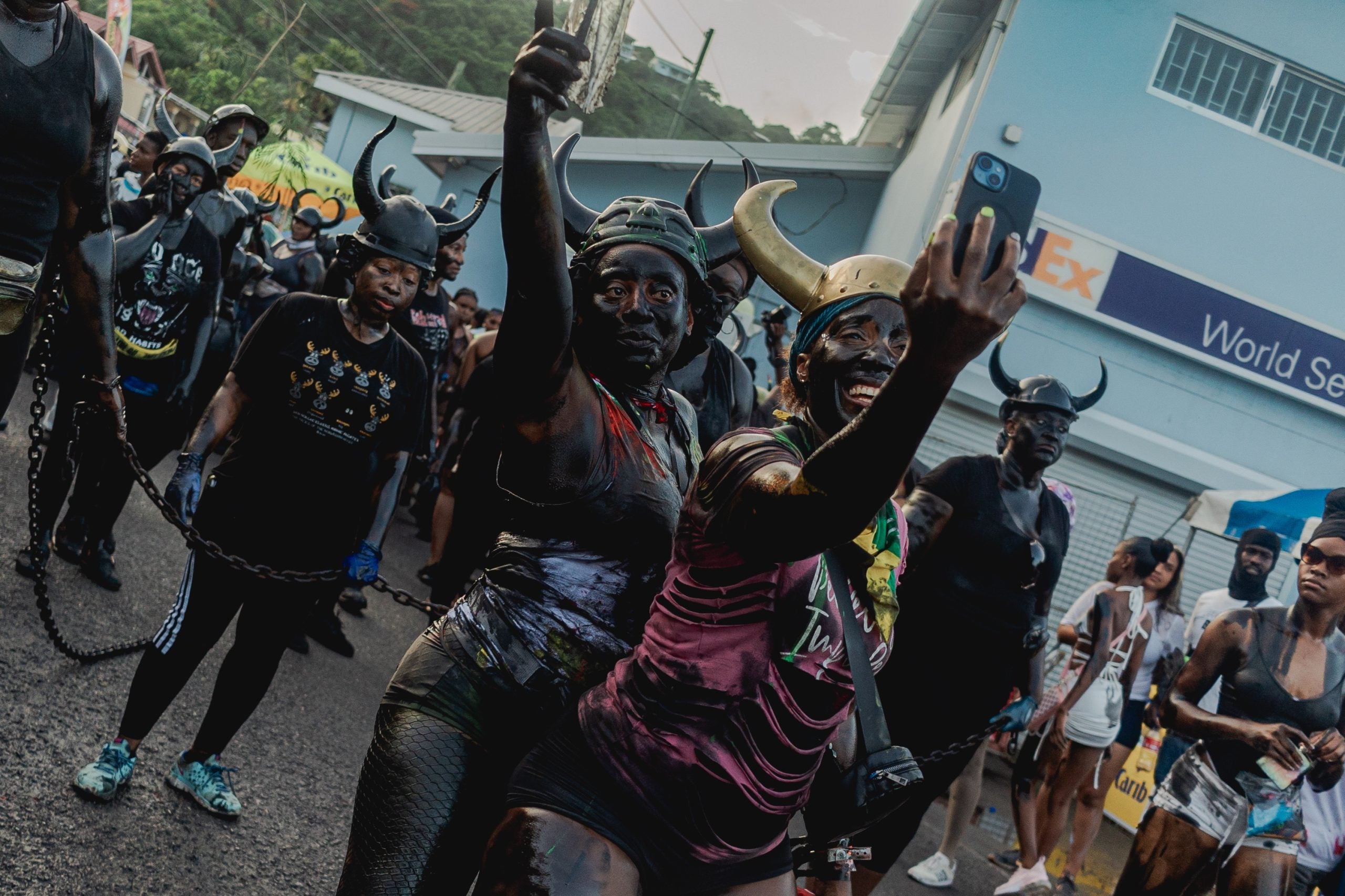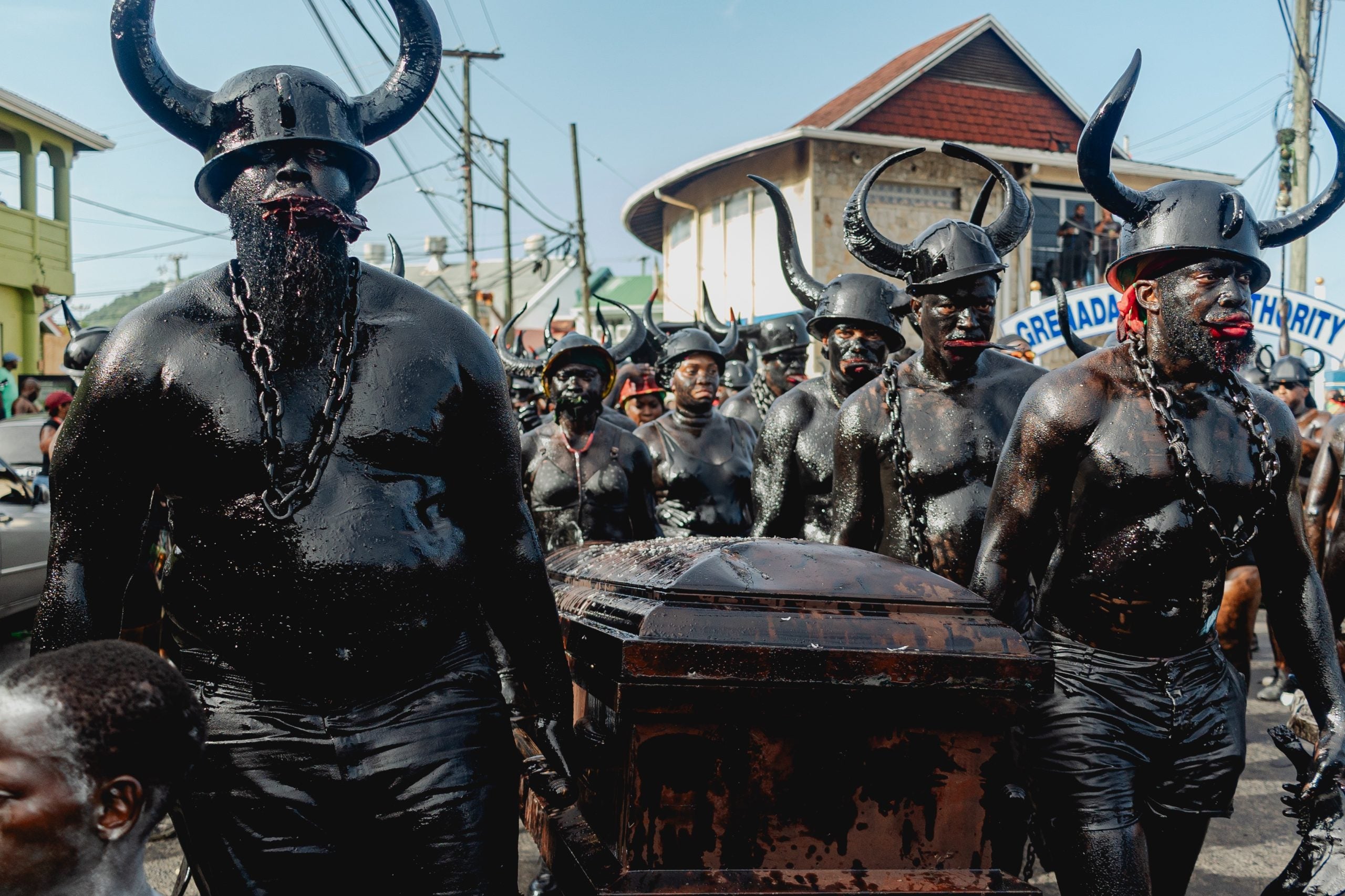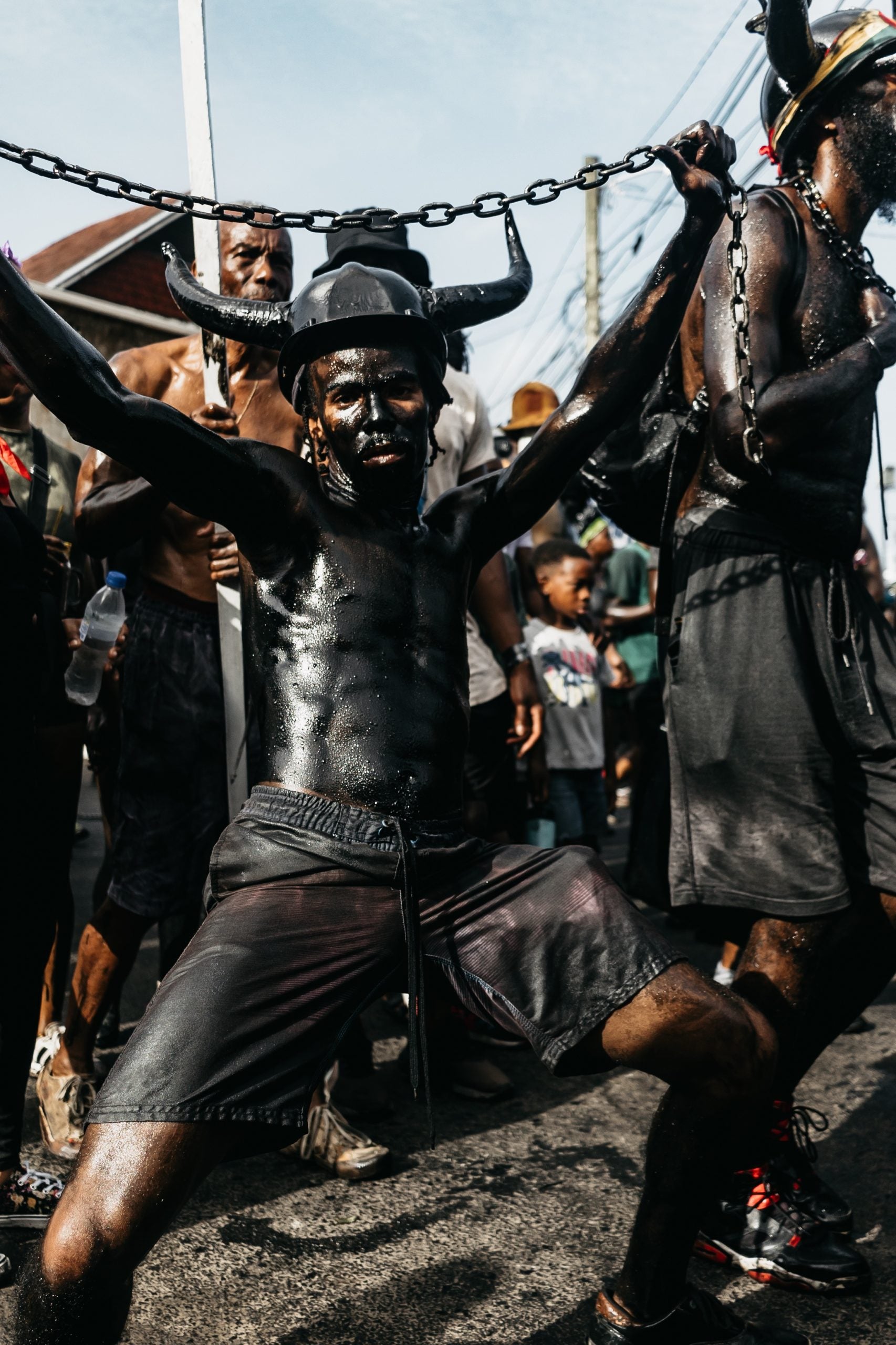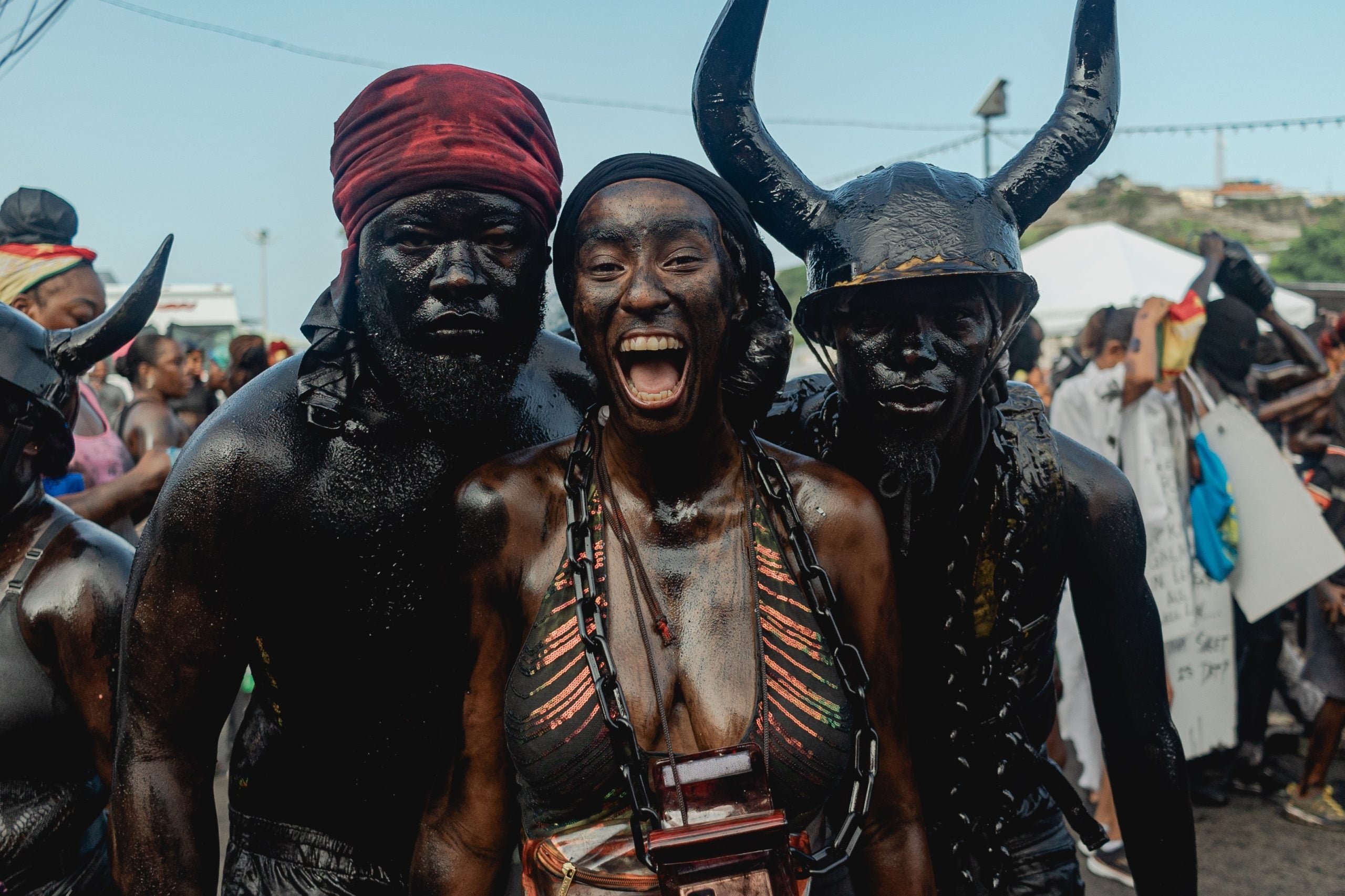
[ad_1]
ST. GEORGES, Grenada— “Life Yuh Life Like Yuh Playing Mas.” Those words from one of my favorite soca songs have often been on my mind this year. It’s because 2023 marked the first time carnival celebrations across the Caribbean, and the diaspora returned in full force.
As a lifelong mas (masquerade) player, I wondered if the lessons learned from the absence of carnival over the past few years had truly stuck with me and whether I would hold firm my resolve to participate in more traditional mas practices and fully embrace the spirit of its roots in Black resistance.
Although an integral part of the celebrations, there is much more to carnival than pretty or fancy mas, where masqueraders dance through the streets donning colorful costumes and feathered backpacks. In Grenada, Jab Jab and its variation of J’ouvert are one-of-a-kind mas customs that distinguish the island’s annual Spicemas celebration from anywhere else in the world.
Just after 4:30 am on J’Ouvert morning in August, I stood outside across the street from the Carenage to prepare to “play Jab,” a traditional yet often misunderstood masquerade. I watched as groups of people began to assemble in the streets covered in Black head to toe, ultimately transforming them into seas of beautiful Blackness. I also listened for the sound of the conch shell, which I learned is the call that signifies when it’s time to take to the streets.
“Jab Jab is freedom. Jab Jab is a post-emancipation masquerade,” says Ian Charles, CEO and Founder of Jambalassee Grenada, a group committed to documenting and preserving Grenada’s Jab Jab tradition, emphasizing the Jab sound. He shared that this celebration dates back to 1834, when slavery was abolished across the English-speaking Caribbean. Grenadians took to the streets to celebrate their freedom and covered themselves in Black. The tradition is celebrated across the country but is deeply embedded in parishes in the countryside, such as St Andrew, St Patrick and St David.

At the very core of the traditional mas form is satire, from its name to the act of blackening one’s skin. In French, “Jab” means “devil,” a derogatory term by which slave owners would refer to enslaved Africans. By painting themselves black and taking on the persona of a devil, or “playing the devil,” the formerly enslaved and their descendants mocked their former masters and the horrifying treatment inflicted upon them.
“We are ridiculing what the oppressors told us we are, substandard, Black, and no good devils. In other words, we are saying, you call me a devil? Well, I’ll show you a devil.”
Jab Jabs are traditionally led by individuals known as Capitals. These leaders play a central role in the masquerade by invoking call-and-response chants known as spellings. This role underscores the importance of oral traditions and storytelling in Caribbean culture, as these chants often convey historical and sociopolitical messages.
The spellings or chants coupled with the sound of the conch shells and a symphony of sound created by the base, the coupé, and cutter drums create the soundtrack of the Jab. These musical elements add depth and rhythm to the masquerade, creating an immersive and energetic atmosphere. The use of traditional instruments reflects the rich musical heritage of the country known as the Spice island.

Charles says it’s crucial to understand that the character of the Jab Jab, or simply Jab, isn’t a reflection of the masquerader’s dark side but rather an imitation of another person’s negative traits. It originated from the formerly enslaved satirizing their masters. “Jab Jab is street theather,” he explains. “We give you everything that you say that is wrong or negative about us, we amplified it and took to the streets.”
During J’Ouvert, people “play Jab” by covering their bodies in either molasses, tar, old engine oil, or black paint, and in recent years, a growing sustainable trend of mixing an oil-based substance like vegetable oil with charcoal. On their heads are repurposed helmets with either cow or goat horns affixed to them, and in their hands are chains, which signify freedom from bondage.

According to Charles, these are considered Jab paraphernalia or props. While the chains and horns are most commonly used, these props can technically be any item. “With the Jab masquerade, the props could be dolls, carts, coffins, and whatnot,” he says.
“You see the chain, which is breaking from shackles, breaking from bondage, both mental and physical. The coffins signifies death to the slave master or to the overseer. You’re going to have anything from animals to phones to wheelchairs to whatever. It doesn’t have a limit to it because it is freedom of expression,” Charles says.
I even saw some Jabs dragging a folding chair through the streets, an ode to the resistance during the “Montgomery Brawl,” where bystanders, including one with a folding chair, jumped in to help a Black riverboat staffer in Mississippi who was attacked after asking boaters to move in order to dock.
“The spirit of the Jab is international,” says Charles, recalling seeing similar scenes on the streets and making the rounds on social media.
The Jab character is an emblem of rebellion against oppression. “Everything that was Black empowerment was seen as bad, was seen as demonic, but we defied that,” explains Charles.
When asked what lessons can be learned from a celebration like this, Charles immediately said it’s about coming together as a people. “By connecting the dots, you really realize as African people as Afro-Caribbean people, as Black people, we were all displaced, but there is beauty and unity in learning each other’s stories. The story of the Jab is one of many,” he says.

As I made my way through the streets of St. George’s covered in oil and charcoal, among thousands of people “playing Jab,” I felt such a sense of joy. Playing mas always helps me find deeper connections to my Caribbean heritage, and this tradition moved me to pause, think, and be grateful. To live my life “like ah playing mas,” as the song goes, means never losing sight of carnival’s roots in revolution and reclamation through affirming experiences like playing Jab.
[ad_2]
Source link







